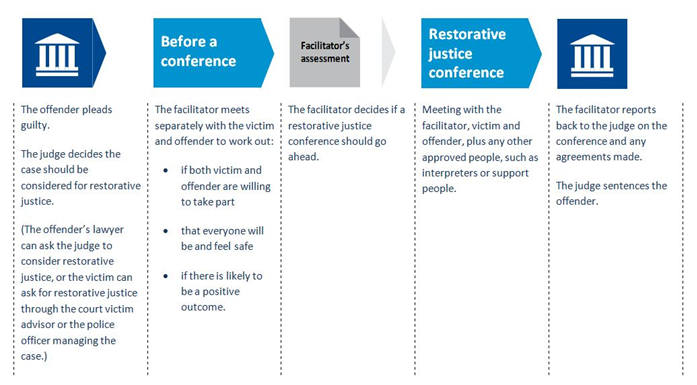How restorative justice works
- Restorative justice helps you put things right
- Who provides restorative justice services?
- Before the conference
- The conference
- After the conference
- The restorative justice process
Restorative justice helps you put things right
A restorative justice conference is an informal, facilitated meeting between a victim, offender, support people and any other approved people, such as community representatives or interpreters.
At a restorative justice conference, you will have the chance to:
- take responsibility for your offending
- apologise to your victim
- decide how to put right the harm you’ve caused
- find ways to make sure you don’t reoffend
A trained facilitator will be at the conference to keep everyone safe and supported. They will also make sure the discussion stays on track.
Restorative justice takes place before you are sentenced in court. The judge will consider any agreements made during the restorative justice conference at the time you are sentenced.
Talk to your lawyer if you want to know more about, or take part in restorative justice.
Who provides restorative justice services?
Restorative justice services are run by community-based groups contracted by the Ministry of Justice. Māori providers are available in many areas. Restorative justice providers are approved by the Ministry to ensure they have experience and training to make sure the restorative justice process is safe and supportive for everyone.
Before the conference
You need to take responsibility for your offending
Before the restorative justice process can begin, you need to plead or be found guilty. If you want to take part in restorative justice, your lawyer can ask the judge to consider it.
If the judge decides that restorative justice should be explored, a trained facilitator will have a pre-conference meeting with you. They will talk with you to see if restorative justice is appropriate for you.
Restorative justice only goes ahead if you want it to.
You need to meet the facilitator
At the pre-conference meeting the facilitator will:
- explain the restorative justice process
- tell you the sort of things that might be talked about at the conference
- describe the sort of agreements that can be made
- explain how everyone will be kept safe and be supported
- encourage you to involve support people (such as your family or friends)
- encourage you to ask questions
The facilitator will ask both you and the victim, separately, if you are interested in participating in restorative justice.
The facilitator can decide not to go ahead with a conference if they think safety is a concern or they think restorative justice won’t help. The facilitator will tell the court if a restorative justice conference is not going to take place. If this happens you will then be sentenced as soon as possible.
Who else might attend a conference?
You will be asked to include family/whānau or friends to support you at the conference. Support people get a chance to speak at the conference.
The facilitator may ask if you agree to other people attending the conference, such as police or a probation officer, your lawyer, or a community representative. The facilitator will ask if you need an interpreter or any other specialist support person to come to the conference.
Your cultural needs will be considered
Your cultural needs, and those of the victim, are an important part of restorative justice. The facilitator will ask if you would like a mihi, prayer or other rituals, a particular location for the conference, or a cultural support person to attend.
The conference
The restorative justice conference takes place before you are sentenced.
A restorative justice conference is an informal, facilitated meeting between you and the victim (or their representative), support people and any others (you have agreed to).
Everyone is at the conference to talk openly and honestly about what happened and what harm was caused. You and the victim may agree a plan of action for you to complete to help put things right.
After the conference
The facilitator writes a report describing what happened at the conference and any agreements made, including timeframes.
The facilitator makes sure the judge gets the report before you are sentenced. You and/or your lawyer also get a copy of the report, along with the victim and anyone else involved in the case, such as the police or probation officer and court victim advisor.
The judge decides whether to include any agreements made at the restorative justice conference as part of your sentence.
The restorative justice process
The victim or offender can cancel the process at any time.

This page was last updated: